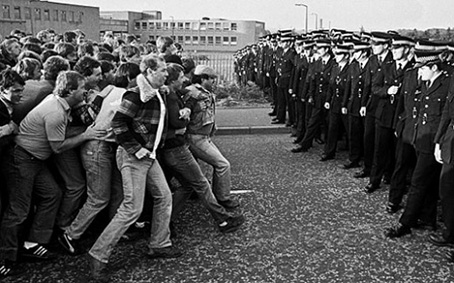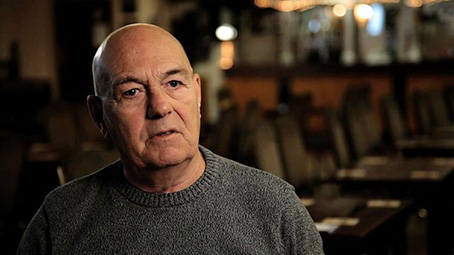"The labour movement had the best opportunity in 50 years to transform
not merely an industrial situation and win an important battle for workers
in struggle, but an opportunity to change the government of the day." |
Arthur Scargill |
"They were skilled and courageous men who had built the prosperity of
Britain. They were treated like criminals by Mrs Thatcher, and they were
right economically as well. It's a story that will never be forgotten." |
Tony Benn |
This government had an idea,
And parliament made it law.
Seems like it's illegal
To fight for the union any more. |
Billy Bragg – 'Which Side Are You On?' |
The 1984 miners' strike was a watershed moment in British political history, a turning point both for the trade union movement and the very concept of collective action. At that time, the National Union of Mineworkers was the strongest trade union in the country and generally regarded as a political force to be reckoned with. Coal was then crucial to the industrial and energy needs of any manufacturing nation (and despite what you may have heard, it still is), and entire communities had evolved around its production. The working conditions were arduous and the long term health issues potentially crippling, but a coal miner at least knew that his job was secure, and the strike of 1974 that effectively brought down Ted Heath's Conservative government had substantially improved the wage of the average mineworker.
Then a Conservative government led by Margaret Thatcher came to power and all of that changed. Determined to break the country's biggest union at any cost, it announced its intention to shut down twenty coal mines with a long term plan to close a further fifty. The mass walkout that this prompted became the longest national strike in British history. And in spite of the propagandist bullshit that is still being peddled by self-serving politicians and tabloid newspapers alike, this was not left-wing extremists simply flexing political muscle; this was about protecting jobs and the communities that were socially and economically reliant on the mines for their very survival. But for the government of the day, the miners and their families were seen as a disposable commodity, people with which they had nothing in common and who could thus be sacrificed in the pursuit of unregulated profit. With the yellow press supporting the government viewpoint (oh, surely not...), the battle for the hearts and minds of a sizeable portion of the general public was won on the back of deception and propaganda, and the eventual defeat of the strikers was painted by the media as a triumph of reason over mob rule.

Does any of this sound familiar? It should. We do, after all, once again have a government that appears to be intent on lining the pockets of the wealthy by punishing the poor and dressing the policies up in a costume of carefully crafted propagandist lies, which are repeated and exaggerated by the tabloid press. Considering the widespread anger this has prompted, cinematic responses have been slow in coming and remain frustratingly thin on the ground. Then slap bang in the middle of the thirtieth anniversary of the miners' strike (I'm going on the basis that the anniversary should last as long as the dispute itself), two films have been released in the space of a month that revisit the miners' struggle in a sympathetic light. The first was Matthew Warchus' hugely enjoyable comedy-drama Pride, which explored the seemingly unlikely but true-life alliance forged by members of the London based fundraising group Lesbians and Gays Support the Miners with the residents of the Welsh mining village of Onllwyn. The second is Owen Gower's inspiring documentary, Still the Enemy Within, a defiant title that transforms Margaret Thatcher's damning description of the more militant miners into a badge of honour for those willing to stand their ground against a system they believed was corrupt.
The film chronicles the build-up to the strike and the timeline of its unfolding, right through to its conclusion and the devastating consequences of defeat. If you're looking for an all-sides-represented view of the dispute then you've come to the wrong place – this is partisan filmmaking and comfortable with it, and given the torrent of misinformation we were subjected to by the press during the strike itself, I have no problem with that and neither should you. Director Gower clearly makes clear his intention in the opening minutes, as former miner Paul Symonds recalls the working conditions and sadly surveys the land where a productive mine once stood and a caption assures us that the story will be told from the viewpoint of the miners. As Gower says in his director's statementcoal industry: "I wanted to capture what it was really like for the ordinary people involved at the centre of such a huge confrontation – the human story behind events that many of us had only ever seen on the news."
Structurally the film is as conventional as they come, a blend of interviews, news footage, photos (some of these are excellent), illustrative graphics and dramatic reconstructions. This is not meant as a criticism – if your story's worth telling and your interviewees are well chosen, there's really no need to jazz it all up with postmodernist tomfoolery, and the story here certainly has no need of such distractions. Over the course of the film there are contributions from a number of those who became involved in the dispute, including former miners, miners' wives and even a representative of the very fundraising group that featured in Pride. There are perhaps not as many contributors as I was expecting given the sheer number involved in the dispute, but as with Ken Loach's The Spirit of '45, when your interviewees are this good and their recollections this enthralling, the best thing you can do is just let them tell their stories.
The lead players are a charismatic trio of former miners named Paul Symonds, Joe Henry and Norman Strike. Yep, you read that right, and yes that's his real name. His experience as what became known as a flying picket are both entertaining and revealing (and well illustrated by archive footage), but he scores a comic coup-de-grace with his story about having to give his name to the police and being accused of taking the piss, encounters that prompted him to start carrying his birth certificate with him to present when challenged. "But they never met my mate," he adds cheerily. "My mate was actually called Will Pickett."

The story that unfolds, particularly for those not familiar with the specifics of the events in question, is as compelling as any drama and plot-busy with a string of triumphs and setbacks. Gower even delivers a centrepiece scene in the shape of what became known as the Battle of Orgreave, a physical confrontation with the police that is ominously foreshadowed by a caption specifying the exact date (you always know something significant is going to happen when that happens in a historical documentary) and former miner Ron Stoate's admission that "I didn't think we were going to walk into what we walked into."
As the film progresses it becomes clear that this is not just a film about miners who fought to keep productive pits open, but a lament for what we have lost in the wake of their defeat. The British coal industry was subsequently decimated and the majority of the coal that fires our power stations and steelworks today is imported from Russia, Columbia and America. Whole communities were left in ruins, and the sense of solidarity that spurred people to pull together en masse in a common cause has suffered what often feels like irrevocable damage, giving birth to a society in which empathy for the most vulnerable is actively discouraged and for many has become an almost alien concept.
With that in mind, the film concludes on an unexpectedly upbeat note with a reminder that – while on a smaller scale and often under-reported – a good many people have not given up the fight and are still willing to organise and protest against social injustice and corporate corruption. And there's never been a better time to get involved. We live, after all, in a country when even working people are currently struggling to pay rent and feed their families, while companies with enough cash to buy up small countries are allowed to dodge paying millions in taxes; where our own government has stripped away access to legal aid, passed the Lobbying Bill in the hope of stifling oppositional voices in the lead up to the election, wants to track every single word you write and read on-line, and has pledged to abolish the Human Rights Act; where corporations have become so powerful that they are undermining the very concept of democracy, and yet oily weasels like George Osborne still have the brass balls to claim that the concept of the free market is under political assault. As George Monbiot so eloquently suggests in his article in today's issue of The Guardian, in the fight for a truly free and fair society, it is these people who are the now the real enemy within.
If you want to know more about the stories behind the headlines during the miners' strike, I heartily recommend The Miners' Campaign Tapes, which was released on UK DVD by the BFI in December 2009. While you're at it, you can check out just how dangerous it was to be a striking miner in 70s America in Barbara Kopple's superb documentary feature, Harlan County USA.
|